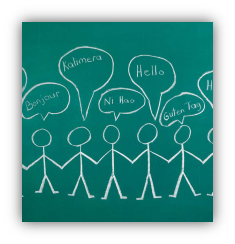Language Centre

Organization name
Language Centre
Dean
Parent OrgUnit
Description
From the first days of its operation in September 2007, the Cyprus University of Technology Language Centre offers to its students, administrative and teaching staff and to the wide public the opportunity to learn foreigner\ languages in a very friendly environment and with the use of the latest theories, methods and materials that are used in the learning and teaching of language, included that of the New Technologies. The objective of the Language Centre is to become a Language Centre of excellence, internationally recognised in the area of learning and the teaching of languages. The courses of the Cyprus University of Technology (CUT) in the five Faculties (Geotechnical Sciences and Environmental Management, Management and Economics, Applied Arts and Communication, Engineering and Technology, and Health Sciences) are taught in Standard Modern Greek, one of the two official languages of the Republic of Cyprus (Country Report, Cyprus, 2004). Nevertheless, taking into consideration the European Language Policy, the objective of the Language Centre considers foreign language learning as integral and essential part of the studies of all students and is within the frames of objectives of the Council of Europe, which promote linguistic variety as well as the learning of various languages in the area of education. The aim of the Language Centre is also within the Language Policy of Cyprus (2003-2005), and it focuses on helping students satisfy the constant demand of the university, which is for its students to know at least two foreign languages. The Language Centre promotes the teaching and learning of languages that is based primarily on the needs of its users. The aim is to extend the linguistic horizon of students so they can cope with any linguistic needs they may come across in their study, in research, in international exchange programmes, in their future career as well as in their personal and social life. To achieve such an aim, the number of students does not exceed that of twenty per language class. The aim of these programmes of study is to completely satisfy the current and future needs of our society and at the same time provide the flexibility of incorporating new technological developments. Via these programmes, the Language Centre offers students the opportunity to improve and develop their linguistic abilities in at least one or two foreign languages and the possibility of appreciating the importance of learning one or more languages for purposes specific to their discipline and their future professional endeavours. The aim of the Language programmes is language competence. The enrichment of the general education, knowledge, skills and experiences of the students constitute an integral part of the language programmes, not only in the language they learn but also in areas such as intercultural communication, computer literacy and autonomous and lifelong learning.
OrgUnit's Researchers publications
(Dept/Workgroup Publication)
Type
- 101 Conference Papers
- 69 Article
- 36 Book Chapter
- 19 MSc Thesis
- 10 Book
- 9 Report
- 6 Presentation
- 4 PhD Thesis
- 2 Poster
- 1 Conference Poster
- next >
Date issued
- 116 2020 - 2024
- 130 2010 - 2019
- 12 2000 - 2009
Journals
- 5 Educational Media International
- 4 Computer Assisted Language Learning
- 4 Language Learning & Technology
- 4 ReCALL
- 4 Universal Access in the Information Society
- 3 CALICO Journal
- 3 Interactive Learning Environments
- 3 Journal of Teaching English for Specific and Academic Purposes
- 2 CALL-EJ
- 2 Computers in Human Behavior
- next >
Fulltext
- 143 No Fulltext
- 115 With Fulltext
Results 241-258 of 258 (Search time: 0.005 seconds).

